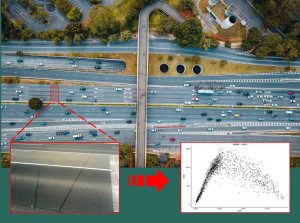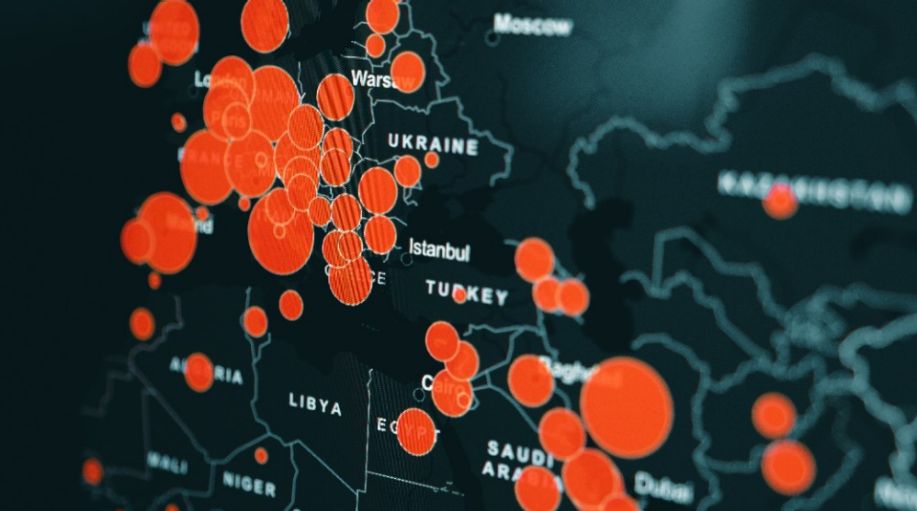CITIES’ Newsletter Issue #2: Transportation
Welcome back to CITIES’ Newsletter. Issue #2 is a deep dive into one of CITIES main research streams: Transportation.

CITIES promotes excellence in research aiming to real improvements in terms of economic opportunity and growth, safety and security, health and wellness, and the overall quality of everyday life in urban areas, with a particular emphasis on Abu Dhabi and the UAE. This newsletter highlights our recent efforts on surface transportation and traffic.

Can Automated Modular Vehicles Change the Way We Design and Benefit from Transportation Systems?
Monica Menendez, Associate Professor of Civil and Urban Engineering, CITIES Director and Lead Principal Investigator
Automated modular vehicle technology (AMVT) has been gaining attention in the last few years. It consists of modular and fully automated vehicle units that can either operate individually or can be combined together en-route forming thereby a single modular vehicle of higher capacity. Such technology can be highly beneficial to a number of transportation systems, ranging from public transportation to emergency medical services. This could be especially valuable for cities like Abu Dhabi, which is at the forefront of technology innovation and deployment, and has a rapidly growing population leading to an increased demand for public transport services and potentially emergency service requests.
In the case of public transportation, we have proposed a novel flexible bus dispatching system, which offers new perspectives and enormous flexibility to better manage the dispatched frequencies and the allocation of the vehicle resources, reducing thereby the operating cost. To do so, we leverage the variable capacity capabilities of the AMVT. This allows us to better address any variations in passenger demand, especially during the last mile, a common issue for cities around the world, including those in the UAE. At the same time, and by taking into account the interactions between public transport and regular traffic, we minimize the impacts on the transportation network and maximize people mobility.
In the case of emergency medical services (EMS), we are now proposing a new and timely concept of smart EMS operations to reduce response times and arrival times to hospital while maximizing service coverage. To that end, we leverage the en-route coupling and decoupling feature of the AMVT in order to enable the en-route transfer of patients and personnel or other resources from one vehicle to another. This could be highly valuable in areas with limited resources (e.g. city’s suburbs) or situations with a high EMS demand (e.g. the COVID pandemic or other disasters such as the recent explosion in Beirut).
Real-Time Analytics for Traffic Operations Management
Saif Eddin Jabari, Assistant Professor of Civil and Urban Engineering, CITIES Principal InvestigatorModern-day urban roads are highly technological systems of interconnected components that can sense vehicles and pedestrians’ presence on the roads. They can communicate with the vehicles, across urban infrastructure components, and with command centers, all in real-time. In U.A.E. cities, specifically Abu Dhabi and Dubai, urban roads include a unique variety of instrumentation types: from sensors under the pavements to detect vehicle presence for traffic control to a dense traffic camera installation for safety applications to overhead gantries at entrances and exits to the city for electronic tolling. These devices generate massive volumes of high-resolution traffic data (second by second), enabling advanced analytics tools for traffic operations management.
Also leveraging the resources at Traffic Flow Dynamics and Computation Group at New York University Abu Dhabi, we are developing a suite of advanced analytics tools for urban traffic management. The team develops tools that combine statistical/machine learning techniques with traffic physics to address traffic operations problems. They utilize a unique high-resolution dataset obtained from local agencies in the U.A.E. to test new algorithms for real-time traffic reconstruction and forecasting, adaptive traffic light control, and incident detection. The short-term forecasting algorithms developed as part of this research were able to accurately forecast second-by-second traffic sensors states with computational complexities that allow for on-line implementations. Such forecasts can improve coordination between consecutive traffic signals and help prevent spillbacks during peak demand periods.
The team has also developed decentralized intersection control tools that are lightweight and robust to unexpected traffic demand patterns. The system utilizes data from sensors and probe vehicles to allocate priority to different traffic streams in a decentralized manner (each intersection controller acting alone) but in a way that achieves specific performance objectives at the network level. The system successfully detects unexpected traffic patterns and starves road segments with incidents, thereby mitigating queue build-up resulting from incidents. The system can also operate in normal traffic conditions and was shown to outperform state-of-the-art adaptive signal controllers used in practice.
Learn more about our research.
CITIES Scholar Participates in the Release of Largest Multi-City Traffic Dataset Publicly Available
Over the last four years, the Institute for Transportation Planning and Systems (IVT) at ETH Zurich and CITIES at NYU Abu Dhabi have gathered urban traffic data from over 40 cities worldwide, including London, Tokyo, and Zurich. In total, almost 5 billion vehicles covering a combined time span of 3.8 years were detected.

Our “UTD19” dataset mainly consists of measurements from 22’820 loop detectors, making it the largest multi-city traffic dataset publicly available. Traffic is recorded using vehicle flow and occupancy (or speed) in relatively small aggregation intervals, typically 3-5min. In addition, we geo-coded the location of all detectors and the associated roads in WGS84 coordinates making map matching as easy as possible.
Learn more.
CITIES Educational Initiatives
Fully aligned with Abu Dhabi 2030 vision, CITIES promotes innovative research that has strong local impact and global relevance. To further advance our mission, in 2020, CITIES activated a new partnership and sponsored a number of research initiatives also aiming to strengthen our educational capabilities.

Cranmore Partners CITIES Program
CITIES and Cranmore Partners have activated a fund that supports 4 exceptional NYUAD undergraduate students with a demonstrated interest in research and academia, by providing a highly competitive one-year research opportunity in CITIES for the whole academic year 2020-2021, including summer. This program aims to identify from the early stage and then foster academic talent, and to contribute to the development of research in the UAE. It is a unique opportunity for bright students to explore innovative research in the area of Urban Science, with a focus on the UAE and the region, spanning disciplines from Engineering, Computer Science, Sociology, History, and the Arts.
Learn more.
CITIES’ Fellowship Program
The CITIES’ Post-graduation Research Fellowship in CITIES at NYU Abu Dhabi is designed to support exceptional NYUAD graduating seniors with a demonstrated interest in academia, by providing a prestigious one-year fellowship. This highly competitive Fellowship Program aims to retain outstanding academic talent within the region and contribute to the growth and development of research in the UAE. It is an excellent opportunity for students to explore research directions and graduate school possibilities, specifically in the area of urban science, spanning disciplines from Engineering, through Computer Science, Sociology, History, and the Arts. In the academic year 2020/2021, CITIES activated two fellowships.

Enhancing Urban Seawall Sustainability Using Ecological Engineering
The aim of this multidisciplinary study is to develop approaches to optimize the material and texture of concrete seawall bricks that are being increasingly used to protect cities against heavy waves, sea storms, and rising sea levels.

Quantifying the Predictive Power of Global Open Datasets
The purpose of this study is to quantify and analyze the predictive power of models trained solely on global open datasets versus those trained on global and local datasets for predicting urban changes.
CITIES Summer Research Program
Each summer CITIES offers a fantastic opportunity to a selected group of talented undergrad students to get their hands dirty on urban science research under the guidance of CITIES faculty. This summer (2020) CITIES activated five summer projects:
- Documenting and visualizing Urban Environments;
- From local traffic phenomena to network congestion;
- Enabling employee discrimination reporting – the role of neighborhood and company composition;
- Effect of microgravity on physical, chemical, micro-structural and mechanical properties of potential materials for planetary construction via 3D printing;
- Design and Characterization of Ultra-High-Performance Concrete using Reactive Magnesium Oxide Cement.
Learn more about the projects.
CITIES and CCS Research Program – Call for Proposals
The Center for Interacting Urban Networks (CITIES) and the Center for Cyber Security (CCS) at NYUAD are jointly inviting scientific proposals for the activation of an interdisciplinary research project at the crossroads of both centers. The ideal interdisciplinary project should touch on aspects related to cities and cyber-security, and propose research that truly reflects the vision of both, CITIES and CCS.
To learn more about the two centers, their vision, and research goals please visit: CITIES and CCS. The selected project will receive funding for a two-year post-doctoral position and one full month of summer salary per year to be distributed among the project PIs.
In line with the NYUAD vision, this program is designed to foster collaboration among faculty from different research centers and divisions, and it is open to any NYUAD faculty. The proposal must involve two faculty members, with at most one affiliated with either Center (e.g. either a faculty member from each of the two funding centers, a faculty member from one of the two funding centers, and an external faculty member, or two external faculty members).
Proposals are due by the end of the day on Sunday, January 10, 2021. They are expected to be around three pages long and should follow this template. All proposals will be reviewed by a committee representing both CITIES and CCS, and a single project will be selected.
For any inquiries please contact [email protected] or [email protected].
What’s coming next?
Stay tuned for the Issue #3 of our newsletter! Our upcoming issue will focus on our efforts to challenge and learn from Covid-19 (SARS-CoV-2).